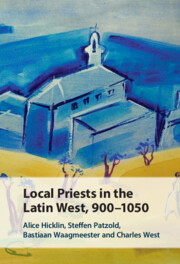Refine search
Actions for selected content:
3 results

Local Priests in the Latin West, 900–1050
-
- Published online:
- 31 October 2025
- Print publication:
- 13 November 2025
-
- Book
-
- You have access
- Open access
- Export citation
Conclusion
-
- Book:
- Flodoard of Rheims and the Writing of History in the Tenth Century
- Published online:
- 05 September 2019
- Print publication:
- 05 September 2019, pp 218-224
-
- Chapter
- Export citation
Introduction
-
- Book:
- Flodoard of Rheims and the Writing of History in the Tenth Century
- Published online:
- 05 September 2019
- Print publication:
- 05 September 2019, pp 1-28
-
- Chapter
- Export citation
